IMAT5262 Research: Ethics & Professionalism in Computing Project
VerifiedAdded on 2023/06/12
|25
|5103
|259
Project
AI Summary
This project proposal investigates the impact of codes of ethics on the professional responsibilities and conduct of ICT professionals. It explores the codes of ethics, specifically focusing on the ACS codes, and compares them with the codes of conduct prevalent in the ICT sector. The research uses literature reviews and documented codes, as well as organizational views to determine how ethical codes influence professional responsibilities. The goal is to identify gaps in professional practices regarding the adoption of ethical codes and to propose recommendations for integrating the two, aiming to promote more ethical behavior among ICT professionals. The project addresses key research questions related to relevant ethical codes, responsibilities of ICT professionals, common codes of conduct, the impact of ethical violations, and the integration of ethics into conduct codes.
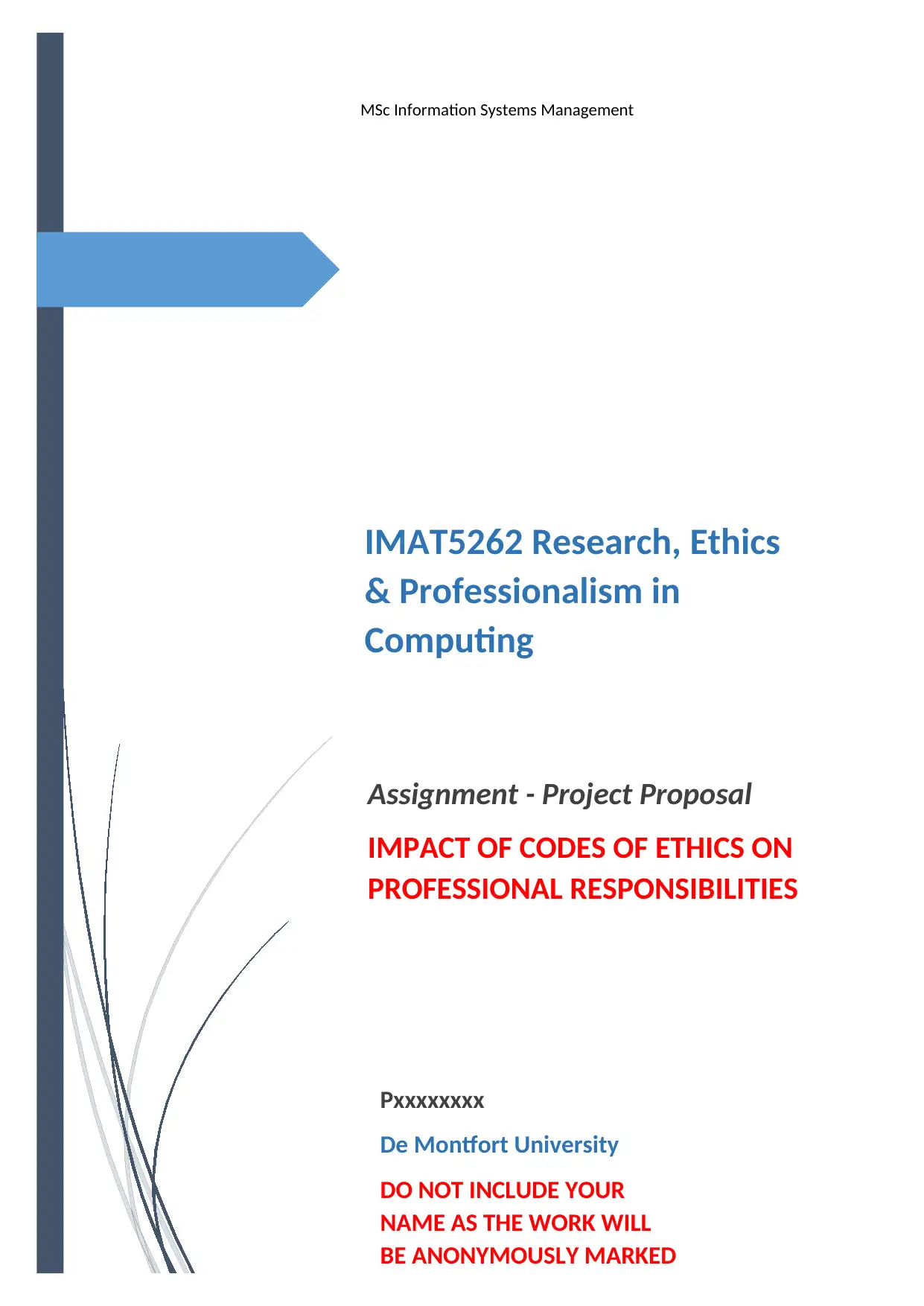
MSc Information Systems Management
IMAT5262 Research, Ethics
& Professionalism in
Computing
Assignment - Project Proposal
IMPACT OF CODES OF ETHICS ON
PROFESSIONAL RESPONSIBILITIES
Pxxxxxxxx
De Montfort University
DO NOT INCLUDE YOUR
NAME AS THE WORK WILL
BE ANONYMOUSLY MARKED
IMAT5262 Research, Ethics
& Professionalism in
Computing
Assignment - Project Proposal
IMPACT OF CODES OF ETHICS ON
PROFESSIONAL RESPONSIBILITIES
Pxxxxxxxx
De Montfort University
DO NOT INCLUDE YOUR
NAME AS THE WORK WILL
BE ANONYMOUSLY MARKED
Paraphrase This Document
Need a fresh take? Get an instant paraphrase of this document with our AI Paraphraser
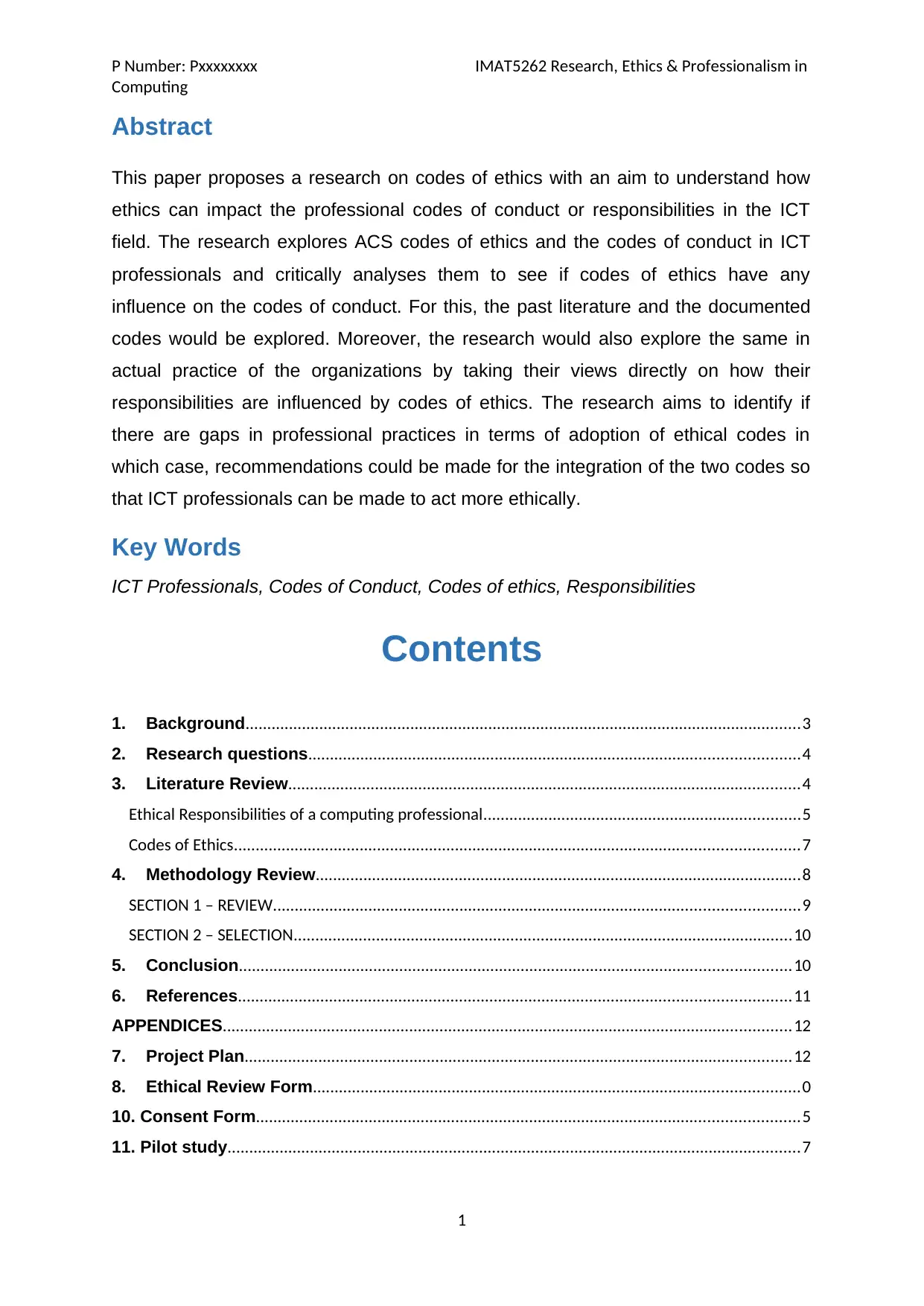
P Number: Pxxxxxxxx IMAT5262 Research, Ethics & Professionalism in
Computing
Abstract
This paper proposes a research on codes of ethics with an aim to understand how
ethics can impact the professional codes of conduct or responsibilities in the ICT
field. The research explores ACS codes of ethics and the codes of conduct in ICT
professionals and critically analyses them to see if codes of ethics have any
influence on the codes of conduct. For this, the past literature and the documented
codes would be explored. Moreover, the research would also explore the same in
actual practice of the organizations by taking their views directly on how their
responsibilities are influenced by codes of ethics. The research aims to identify if
there are gaps in professional practices in terms of adoption of ethical codes in
which case, recommendations could be made for the integration of the two codes so
that ICT professionals can be made to act more ethically.
Key Words
ICT Professionals, Codes of Conduct, Codes of ethics, Responsibilities
Contents
1. Background................................................................................................................................3
2. Research questions.................................................................................................................4
3. Literature Review......................................................................................................................4
Ethical Responsibilities of a computing professional.........................................................................5
Codes of Ethics..................................................................................................................................7
4. Methodology Review................................................................................................................8
SECTION 1 – REVIEW.........................................................................................................................9
SECTION 2 – SELECTION...................................................................................................................10
5. Conclusion...............................................................................................................................10
6. References...............................................................................................................................11
APPENDICES...................................................................................................................................12
7. Project Plan..............................................................................................................................12
8. Ethical Review Form................................................................................................................0
10. Consent Form.............................................................................................................................5
11. Pilot study....................................................................................................................................7
1
Computing
Abstract
This paper proposes a research on codes of ethics with an aim to understand how
ethics can impact the professional codes of conduct or responsibilities in the ICT
field. The research explores ACS codes of ethics and the codes of conduct in ICT
professionals and critically analyses them to see if codes of ethics have any
influence on the codes of conduct. For this, the past literature and the documented
codes would be explored. Moreover, the research would also explore the same in
actual practice of the organizations by taking their views directly on how their
responsibilities are influenced by codes of ethics. The research aims to identify if
there are gaps in professional practices in terms of adoption of ethical codes in
which case, recommendations could be made for the integration of the two codes so
that ICT professionals can be made to act more ethically.
Key Words
ICT Professionals, Codes of Conduct, Codes of ethics, Responsibilities
Contents
1. Background................................................................................................................................3
2. Research questions.................................................................................................................4
3. Literature Review......................................................................................................................4
Ethical Responsibilities of a computing professional.........................................................................5
Codes of Ethics..................................................................................................................................7
4. Methodology Review................................................................................................................8
SECTION 1 – REVIEW.........................................................................................................................9
SECTION 2 – SELECTION...................................................................................................................10
5. Conclusion...............................................................................................................................10
6. References...............................................................................................................................11
APPENDICES...................................................................................................................................12
7. Project Plan..............................................................................................................................12
8. Ethical Review Form................................................................................................................0
10. Consent Form.............................................................................................................................5
11. Pilot study....................................................................................................................................7
1
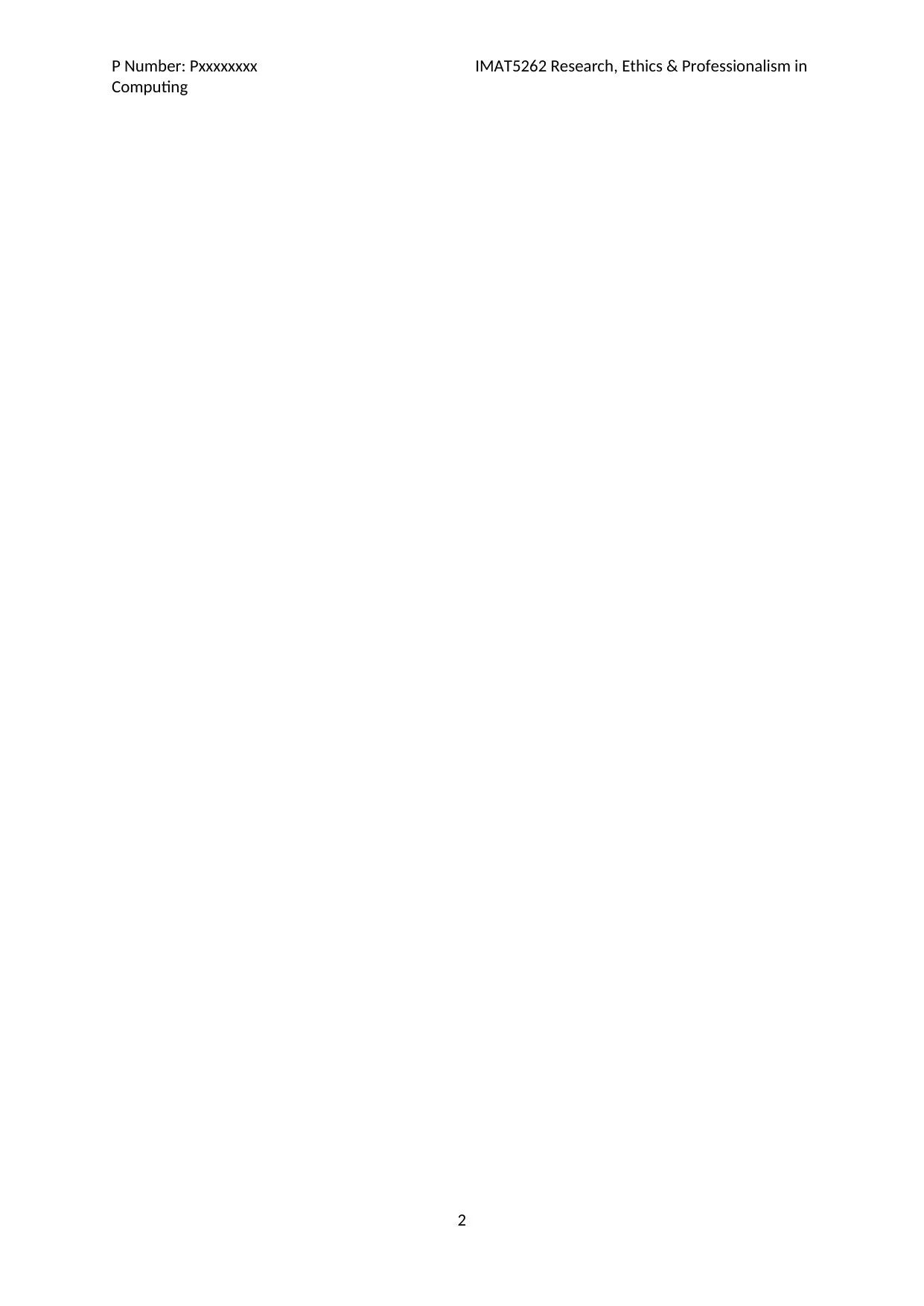
P Number: Pxxxxxxxx IMAT5262 Research, Ethics & Professionalism in
Computing
2
Computing
2
⊘ This is a preview!⊘
Do you want full access?
Subscribe today to unlock all pages.

Trusted by 1+ million students worldwide
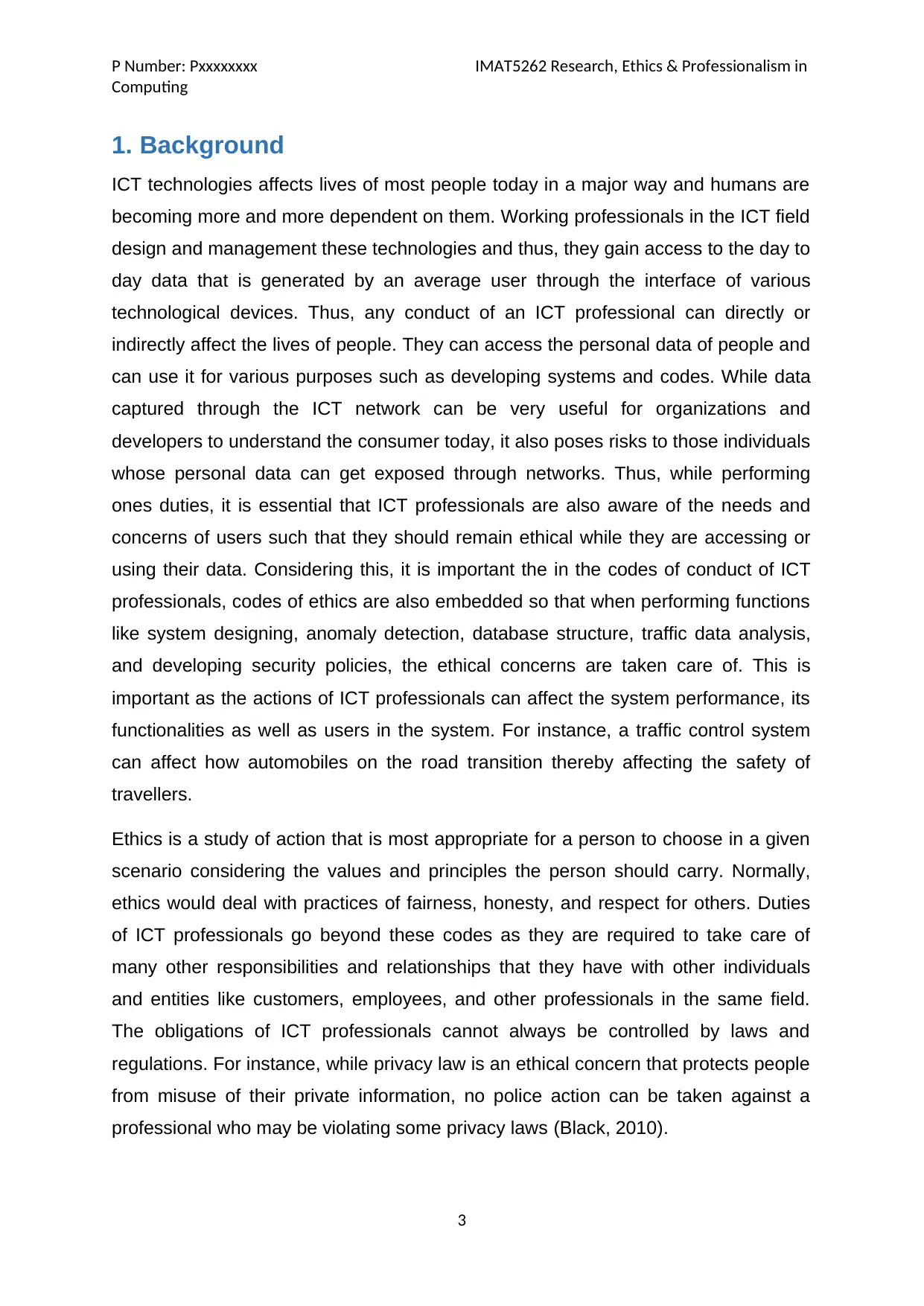
P Number: Pxxxxxxxx IMAT5262 Research, Ethics & Professionalism in
Computing
1. Background
ICT technologies affects lives of most people today in a major way and humans are
becoming more and more dependent on them. Working professionals in the ICT field
design and management these technologies and thus, they gain access to the day to
day data that is generated by an average user through the interface of various
technological devices. Thus, any conduct of an ICT professional can directly or
indirectly affect the lives of people. They can access the personal data of people and
can use it for various purposes such as developing systems and codes. While data
captured through the ICT network can be very useful for organizations and
developers to understand the consumer today, it also poses risks to those individuals
whose personal data can get exposed through networks. Thus, while performing
ones duties, it is essential that ICT professionals are also aware of the needs and
concerns of users such that they should remain ethical while they are accessing or
using their data. Considering this, it is important the in the codes of conduct of ICT
professionals, codes of ethics are also embedded so that when performing functions
like system designing, anomaly detection, database structure, traffic data analysis,
and developing security policies, the ethical concerns are taken care of. This is
important as the actions of ICT professionals can affect the system performance, its
functionalities as well as users in the system. For instance, a traffic control system
can affect how automobiles on the road transition thereby affecting the safety of
travellers.
Ethics is a study of action that is most appropriate for a person to choose in a given
scenario considering the values and principles the person should carry. Normally,
ethics would deal with practices of fairness, honesty, and respect for others. Duties
of ICT professionals go beyond these codes as they are required to take care of
many other responsibilities and relationships that they have with other individuals
and entities like customers, employees, and other professionals in the same field.
The obligations of ICT professionals cannot always be controlled by laws and
regulations. For instance, while privacy law is an ethical concern that protects people
from misuse of their private information, no police action can be taken against a
professional who may be violating some privacy laws (Black, 2010).
3
Computing
1. Background
ICT technologies affects lives of most people today in a major way and humans are
becoming more and more dependent on them. Working professionals in the ICT field
design and management these technologies and thus, they gain access to the day to
day data that is generated by an average user through the interface of various
technological devices. Thus, any conduct of an ICT professional can directly or
indirectly affect the lives of people. They can access the personal data of people and
can use it for various purposes such as developing systems and codes. While data
captured through the ICT network can be very useful for organizations and
developers to understand the consumer today, it also poses risks to those individuals
whose personal data can get exposed through networks. Thus, while performing
ones duties, it is essential that ICT professionals are also aware of the needs and
concerns of users such that they should remain ethical while they are accessing or
using their data. Considering this, it is important the in the codes of conduct of ICT
professionals, codes of ethics are also embedded so that when performing functions
like system designing, anomaly detection, database structure, traffic data analysis,
and developing security policies, the ethical concerns are taken care of. This is
important as the actions of ICT professionals can affect the system performance, its
functionalities as well as users in the system. For instance, a traffic control system
can affect how automobiles on the road transition thereby affecting the safety of
travellers.
Ethics is a study of action that is most appropriate for a person to choose in a given
scenario considering the values and principles the person should carry. Normally,
ethics would deal with practices of fairness, honesty, and respect for others. Duties
of ICT professionals go beyond these codes as they are required to take care of
many other responsibilities and relationships that they have with other individuals
and entities like customers, employees, and other professionals in the same field.
The obligations of ICT professionals cannot always be controlled by laws and
regulations. For instance, while privacy law is an ethical concern that protects people
from misuse of their private information, no police action can be taken against a
professional who may be violating some privacy laws (Black, 2010).
3
Paraphrase This Document
Need a fresh take? Get an instant paraphrase of this document with our AI Paraphraser
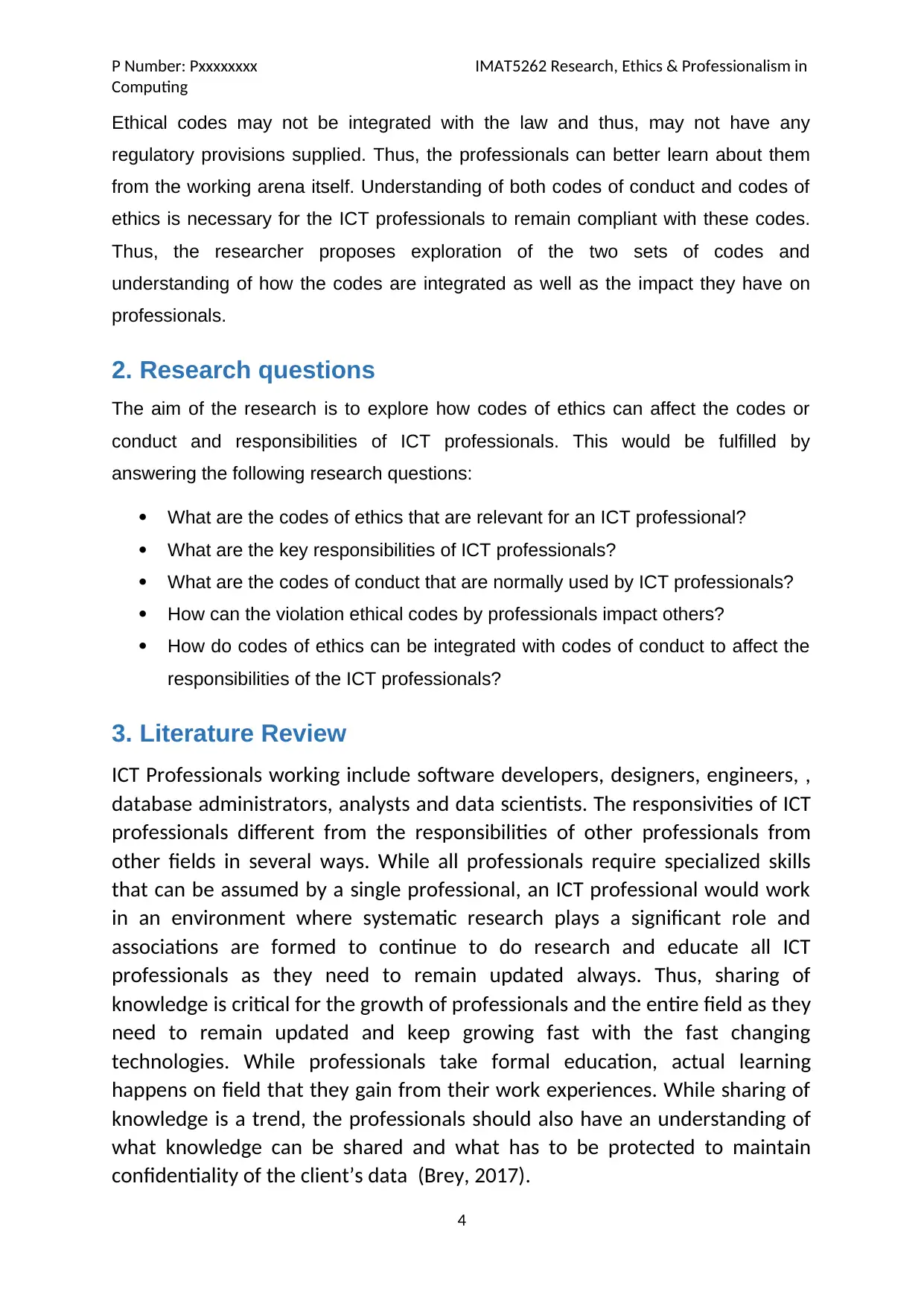
P Number: Pxxxxxxxx IMAT5262 Research, Ethics & Professionalism in
Computing
Ethical codes may not be integrated with the law and thus, may not have any
regulatory provisions supplied. Thus, the professionals can better learn about them
from the working arena itself. Understanding of both codes of conduct and codes of
ethics is necessary for the ICT professionals to remain compliant with these codes.
Thus, the researcher proposes exploration of the two sets of codes and
understanding of how the codes are integrated as well as the impact they have on
professionals.
2. Research questions
The aim of the research is to explore how codes of ethics can affect the codes or
conduct and responsibilities of ICT professionals. This would be fulfilled by
answering the following research questions:
What are the codes of ethics that are relevant for an ICT professional?
What are the key responsibilities of ICT professionals?
What are the codes of conduct that are normally used by ICT professionals?
How can the violation ethical codes by professionals impact others?
How do codes of ethics can be integrated with codes of conduct to affect the
responsibilities of the ICT professionals?
3. Literature Review
ICT Professionals working include software developers, designers, engineers, ,
database administrators, analysts and data scientists. The responsivities of ICT
professionals different from the responsibilities of other professionals from
other fields in several ways. While all professionals require specialized skills
that can be assumed by a single professional, an ICT professional would work
in an environment where systematic research plays a significant role and
associations are formed to continue to do research and educate all ICT
professionals as they need to remain updated always. Thus, sharing of
knowledge is critical for the growth of professionals and the entire field as they
need to remain updated and keep growing fast with the fast changing
technologies. While professionals take formal education, actual learning
happens on field that they gain from their work experiences. While sharing of
knowledge is a trend, the professionals should also have an understanding of
what knowledge can be shared and what has to be protected to maintain
confidentiality of the client’s data (Brey, 2017).
4
Computing
Ethical codes may not be integrated with the law and thus, may not have any
regulatory provisions supplied. Thus, the professionals can better learn about them
from the working arena itself. Understanding of both codes of conduct and codes of
ethics is necessary for the ICT professionals to remain compliant with these codes.
Thus, the researcher proposes exploration of the two sets of codes and
understanding of how the codes are integrated as well as the impact they have on
professionals.
2. Research questions
The aim of the research is to explore how codes of ethics can affect the codes or
conduct and responsibilities of ICT professionals. This would be fulfilled by
answering the following research questions:
What are the codes of ethics that are relevant for an ICT professional?
What are the key responsibilities of ICT professionals?
What are the codes of conduct that are normally used by ICT professionals?
How can the violation ethical codes by professionals impact others?
How do codes of ethics can be integrated with codes of conduct to affect the
responsibilities of the ICT professionals?
3. Literature Review
ICT Professionals working include software developers, designers, engineers, ,
database administrators, analysts and data scientists. The responsivities of ICT
professionals different from the responsibilities of other professionals from
other fields in several ways. While all professionals require specialized skills
that can be assumed by a single professional, an ICT professional would work
in an environment where systematic research plays a significant role and
associations are formed to continue to do research and educate all ICT
professionals as they need to remain updated always. Thus, sharing of
knowledge is critical for the growth of professionals and the entire field as they
need to remain updated and keep growing fast with the fast changing
technologies. While professionals take formal education, actual learning
happens on field that they gain from their work experiences. While sharing of
knowledge is a trend, the professionals should also have an understanding of
what knowledge can be shared and what has to be protected to maintain
confidentiality of the client’s data (Brey, 2017).
4
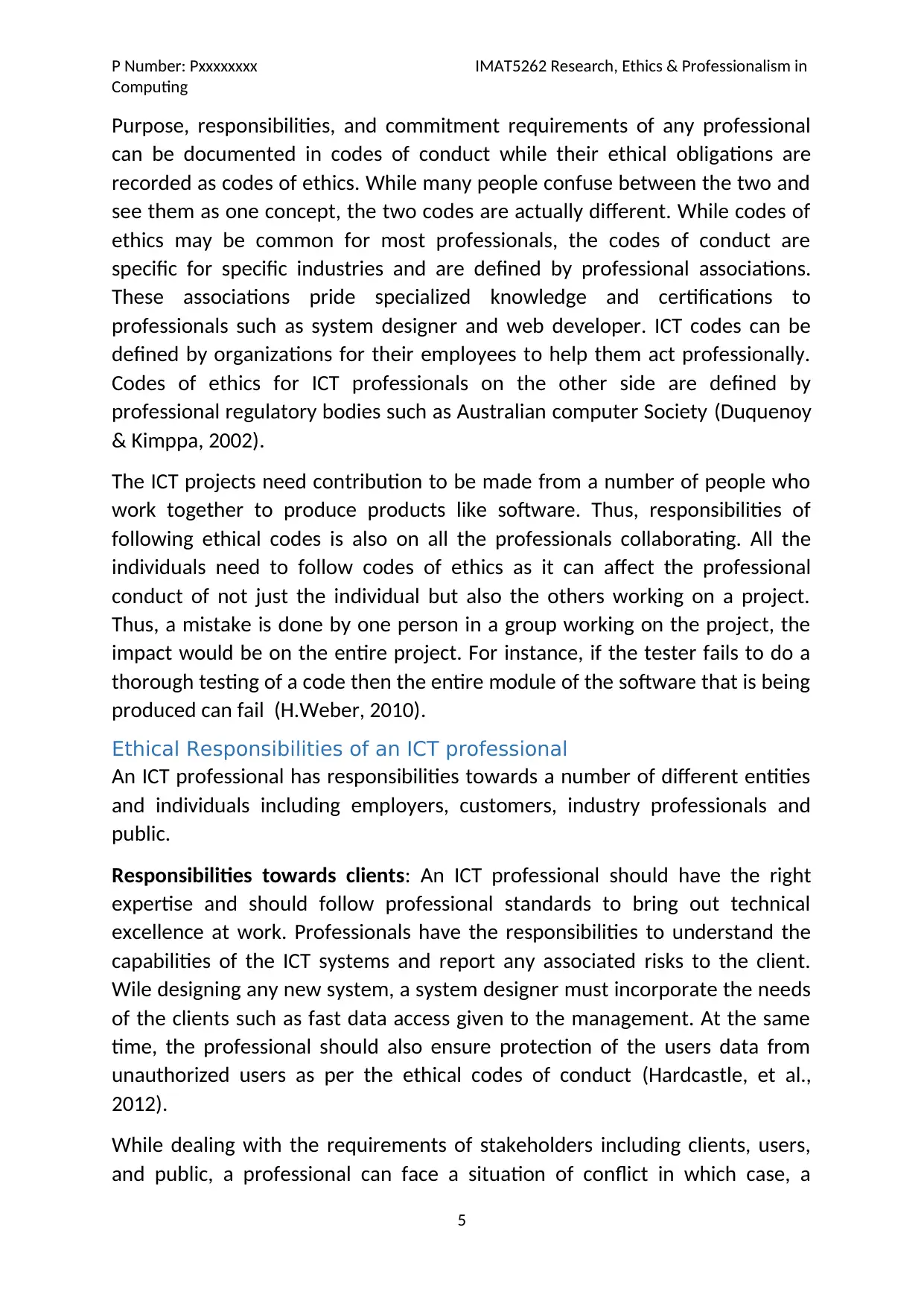
P Number: Pxxxxxxxx IMAT5262 Research, Ethics & Professionalism in
Computing
Purpose, responsibilities, and commitment requirements of any professional
can be documented in codes of conduct while their ethical obligations are
recorded as codes of ethics. While many people confuse between the two and
see them as one concept, the two codes are actually different. While codes of
ethics may be common for most professionals, the codes of conduct are
specific for specific industries and are defined by professional associations.
These associations pride specialized knowledge and certifications to
professionals such as system designer and web developer. ICT codes can be
defined by organizations for their employees to help them act professionally.
Codes of ethics for ICT professionals on the other side are defined by
professional regulatory bodies such as Australian computer Society (Duquenoy
& Kimppa, 2002).
The ICT projects need contribution to be made from a number of people who
work together to produce products like software. Thus, responsibilities of
following ethical codes is also on all the professionals collaborating. All the
individuals need to follow codes of ethics as it can affect the professional
conduct of not just the individual but also the others working on a project.
Thus, a mistake is done by one person in a group working on the project, the
impact would be on the entire project. For instance, if the tester fails to do a
thorough testing of a code then the entire module of the software that is being
produced can fail (H.Weber, 2010).
Ethical Responsibilities of an ICT professional
An ICT professional has responsibilities towards a number of different entities
and individuals including employers, customers, industry professionals and
public.
Responsibilities towards clients: An ICT professional should have the right
expertise and should follow professional standards to bring out technical
excellence at work. Professionals have the responsibilities to understand the
capabilities of the ICT systems and report any associated risks to the client.
Wile designing any new system, a system designer must incorporate the needs
of the clients such as fast data access given to the management. At the same
time, the professional should also ensure protection of the users data from
unauthorized users as per the ethical codes of conduct (Hardcastle, et al.,
2012).
While dealing with the requirements of stakeholders including clients, users,
and public, a professional can face a situation of conflict in which case, a
5
Computing
Purpose, responsibilities, and commitment requirements of any professional
can be documented in codes of conduct while their ethical obligations are
recorded as codes of ethics. While many people confuse between the two and
see them as one concept, the two codes are actually different. While codes of
ethics may be common for most professionals, the codes of conduct are
specific for specific industries and are defined by professional associations.
These associations pride specialized knowledge and certifications to
professionals such as system designer and web developer. ICT codes can be
defined by organizations for their employees to help them act professionally.
Codes of ethics for ICT professionals on the other side are defined by
professional regulatory bodies such as Australian computer Society (Duquenoy
& Kimppa, 2002).
The ICT projects need contribution to be made from a number of people who
work together to produce products like software. Thus, responsibilities of
following ethical codes is also on all the professionals collaborating. All the
individuals need to follow codes of ethics as it can affect the professional
conduct of not just the individual but also the others working on a project.
Thus, a mistake is done by one person in a group working on the project, the
impact would be on the entire project. For instance, if the tester fails to do a
thorough testing of a code then the entire module of the software that is being
produced can fail (H.Weber, 2010).
Ethical Responsibilities of an ICT professional
An ICT professional has responsibilities towards a number of different entities
and individuals including employers, customers, industry professionals and
public.
Responsibilities towards clients: An ICT professional should have the right
expertise and should follow professional standards to bring out technical
excellence at work. Professionals have the responsibilities to understand the
capabilities of the ICT systems and report any associated risks to the client.
Wile designing any new system, a system designer must incorporate the needs
of the clients such as fast data access given to the management. At the same
time, the professional should also ensure protection of the users data from
unauthorized users as per the ethical codes of conduct (Hardcastle, et al.,
2012).
While dealing with the requirements of stakeholders including clients, users,
and public, a professional can face a situation of conflict in which case, a
5
⊘ This is a preview!⊘
Do you want full access?
Subscribe today to unlock all pages.

Trusted by 1+ million students worldwide
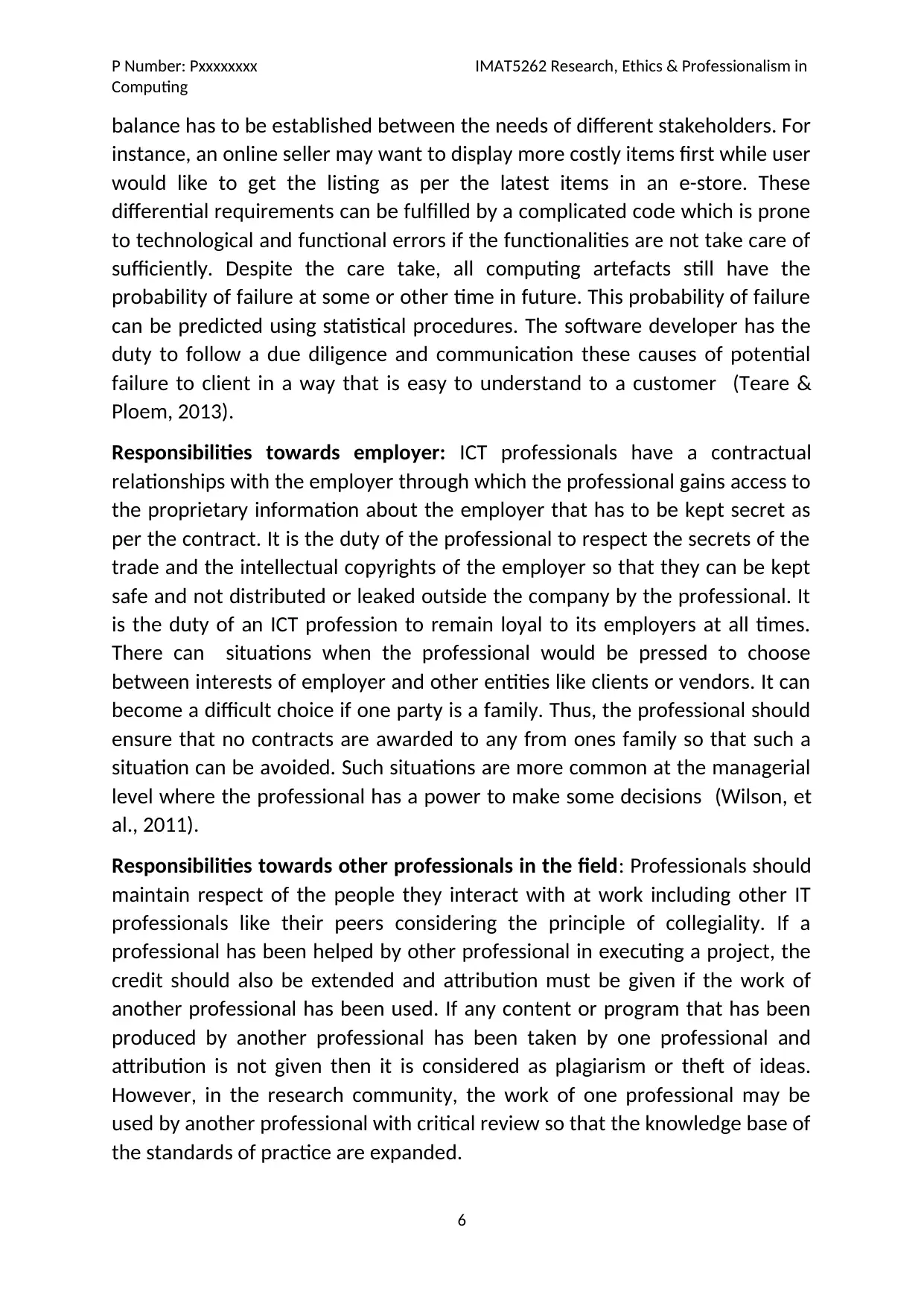
P Number: Pxxxxxxxx IMAT5262 Research, Ethics & Professionalism in
Computing
balance has to be established between the needs of different stakeholders. For
instance, an online seller may want to display more costly items first while user
would like to get the listing as per the latest items in an e-store. These
differential requirements can be fulfilled by a complicated code which is prone
to technological and functional errors if the functionalities are not take care of
sufficiently. Despite the care take, all computing artefacts still have the
probability of failure at some or other time in future. This probability of failure
can be predicted using statistical procedures. The software developer has the
duty to follow a due diligence and communication these causes of potential
failure to client in a way that is easy to understand to a customer (Teare &
Ploem, 2013).
Responsibilities towards employer: ICT professionals have a contractual
relationships with the employer through which the professional gains access to
the proprietary information about the employer that has to be kept secret as
per the contract. It is the duty of the professional to respect the secrets of the
trade and the intellectual copyrights of the employer so that they can be kept
safe and not distributed or leaked outside the company by the professional. It
is the duty of an ICT profession to remain loyal to its employers at all times.
There can situations when the professional would be pressed to choose
between interests of employer and other entities like clients or vendors. It can
become a difficult choice if one party is a family. Thus, the professional should
ensure that no contracts are awarded to any from ones family so that such a
situation can be avoided. Such situations are more common at the managerial
level where the professional has a power to make some decisions (Wilson, et
al., 2011).
Responsibilities towards other professionals in the field: Professionals should
maintain respect of the people they interact with at work including other IT
professionals like their peers considering the principle of collegiality. If a
professional has been helped by other professional in executing a project, the
credit should also be extended and attribution must be given if the work of
another professional has been used. If any content or program that has been
produced by another professional has been taken by one professional and
attribution is not given then it is considered as plagiarism or theft of ideas.
However, in the research community, the work of one professional may be
used by another professional with critical review so that the knowledge base of
the standards of practice are expanded.
6
Computing
balance has to be established between the needs of different stakeholders. For
instance, an online seller may want to display more costly items first while user
would like to get the listing as per the latest items in an e-store. These
differential requirements can be fulfilled by a complicated code which is prone
to technological and functional errors if the functionalities are not take care of
sufficiently. Despite the care take, all computing artefacts still have the
probability of failure at some or other time in future. This probability of failure
can be predicted using statistical procedures. The software developer has the
duty to follow a due diligence and communication these causes of potential
failure to client in a way that is easy to understand to a customer (Teare &
Ploem, 2013).
Responsibilities towards employer: ICT professionals have a contractual
relationships with the employer through which the professional gains access to
the proprietary information about the employer that has to be kept secret as
per the contract. It is the duty of the professional to respect the secrets of the
trade and the intellectual copyrights of the employer so that they can be kept
safe and not distributed or leaked outside the company by the professional. It
is the duty of an ICT profession to remain loyal to its employers at all times.
There can situations when the professional would be pressed to choose
between interests of employer and other entities like clients or vendors. It can
become a difficult choice if one party is a family. Thus, the professional should
ensure that no contracts are awarded to any from ones family so that such a
situation can be avoided. Such situations are more common at the managerial
level where the professional has a power to make some decisions (Wilson, et
al., 2011).
Responsibilities towards other professionals in the field: Professionals should
maintain respect of the people they interact with at work including other IT
professionals like their peers considering the principle of collegiality. If a
professional has been helped by other professional in executing a project, the
credit should also be extended and attribution must be given if the work of
another professional has been used. If any content or program that has been
produced by another professional has been taken by one professional and
attribution is not given then it is considered as plagiarism or theft of ideas.
However, in the research community, the work of one professional may be
used by another professional with critical review so that the knowledge base of
the standards of practice are expanded.
6
Paraphrase This Document
Need a fresh take? Get an instant paraphrase of this document with our AI Paraphraser
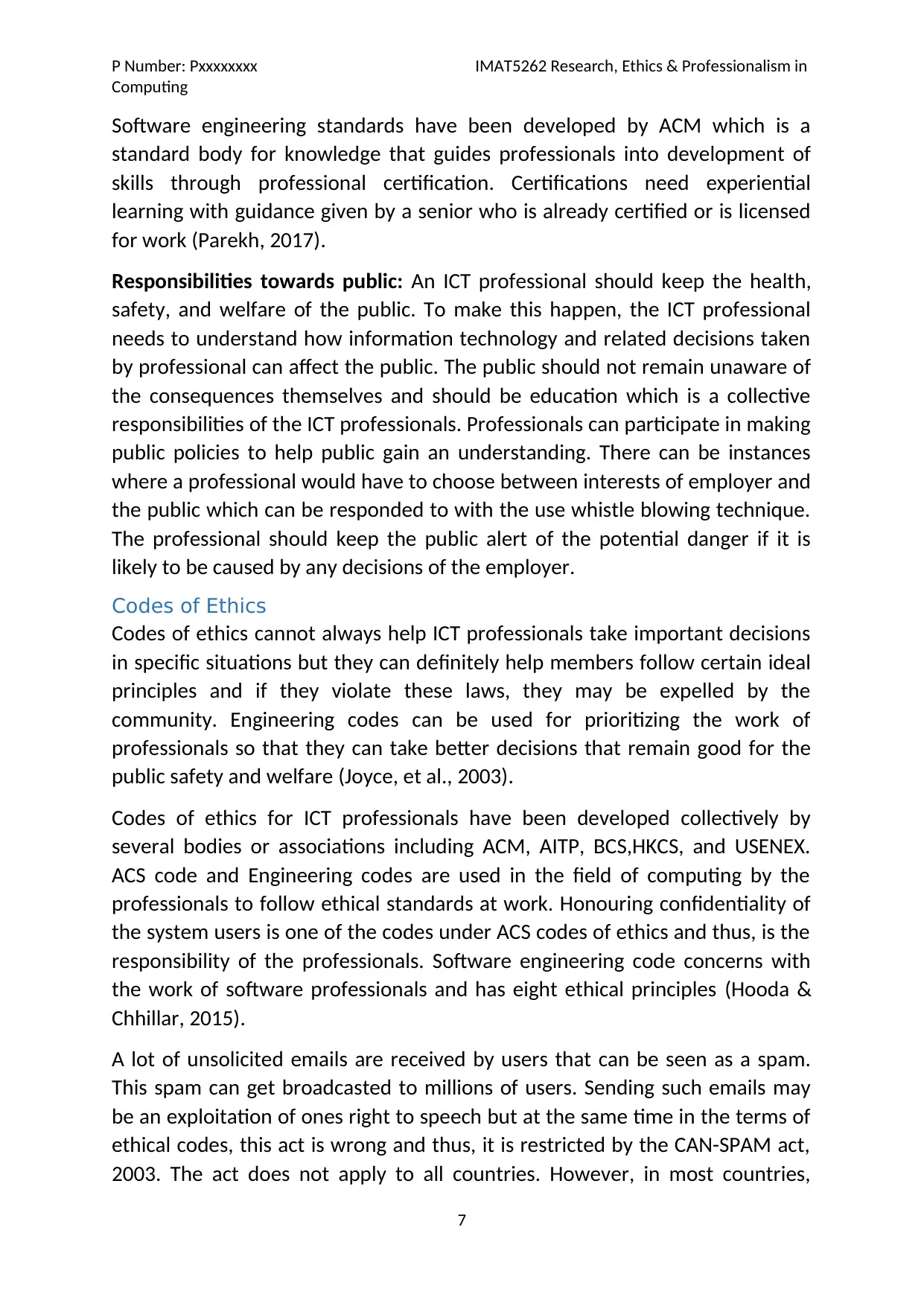
P Number: Pxxxxxxxx IMAT5262 Research, Ethics & Professionalism in
Computing
Software engineering standards have been developed by ACM which is a
standard body for knowledge that guides professionals into development of
skills through professional certification. Certifications need experiential
learning with guidance given by a senior who is already certified or is licensed
for work (Parekh, 2017).
Responsibilities towards public: An ICT professional should keep the health,
safety, and welfare of the public. To make this happen, the ICT professional
needs to understand how information technology and related decisions taken
by professional can affect the public. The public should not remain unaware of
the consequences themselves and should be education which is a collective
responsibilities of the ICT professionals. Professionals can participate in making
public policies to help public gain an understanding. There can be instances
where a professional would have to choose between interests of employer and
the public which can be responded to with the use whistle blowing technique.
The professional should keep the public alert of the potential danger if it is
likely to be caused by any decisions of the employer.
Codes of Ethics
Codes of ethics cannot always help ICT professionals take important decisions
in specific situations but they can definitely help members follow certain ideal
principles and if they violate these laws, they may be expelled by the
community. Engineering codes can be used for prioritizing the work of
professionals so that they can take better decisions that remain good for the
public safety and welfare (Joyce, et al., 2003).
Codes of ethics for ICT professionals have been developed collectively by
several bodies or associations including ACM, AITP, BCS,HKCS, and USENEX.
ACS code and Engineering codes are used in the field of computing by the
professionals to follow ethical standards at work. Honouring confidentiality of
the system users is one of the codes under ACS codes of ethics and thus, is the
responsibility of the professionals. Software engineering code concerns with
the work of software professionals and has eight ethical principles (Hooda &
Chhillar, 2015).
A lot of unsolicited emails are received by users that can be seen as a spam.
This spam can get broadcasted to millions of users. Sending such emails may
be an exploitation of ones right to speech but at the same time in the terms of
ethical codes, this act is wrong and thus, it is restricted by the CAN-SPAM act,
2003. The act does not apply to all countries. However, in most countries,
7
Computing
Software engineering standards have been developed by ACM which is a
standard body for knowledge that guides professionals into development of
skills through professional certification. Certifications need experiential
learning with guidance given by a senior who is already certified or is licensed
for work (Parekh, 2017).
Responsibilities towards public: An ICT professional should keep the health,
safety, and welfare of the public. To make this happen, the ICT professional
needs to understand how information technology and related decisions taken
by professional can affect the public. The public should not remain unaware of
the consequences themselves and should be education which is a collective
responsibilities of the ICT professionals. Professionals can participate in making
public policies to help public gain an understanding. There can be instances
where a professional would have to choose between interests of employer and
the public which can be responded to with the use whistle blowing technique.
The professional should keep the public alert of the potential danger if it is
likely to be caused by any decisions of the employer.
Codes of Ethics
Codes of ethics cannot always help ICT professionals take important decisions
in specific situations but they can definitely help members follow certain ideal
principles and if they violate these laws, they may be expelled by the
community. Engineering codes can be used for prioritizing the work of
professionals so that they can take better decisions that remain good for the
public safety and welfare (Joyce, et al., 2003).
Codes of ethics for ICT professionals have been developed collectively by
several bodies or associations including ACM, AITP, BCS,HKCS, and USENEX.
ACS code and Engineering codes are used in the field of computing by the
professionals to follow ethical standards at work. Honouring confidentiality of
the system users is one of the codes under ACS codes of ethics and thus, is the
responsibility of the professionals. Software engineering code concerns with
the work of software professionals and has eight ethical principles (Hooda &
Chhillar, 2015).
A lot of unsolicited emails are received by users that can be seen as a spam.
This spam can get broadcasted to millions of users. Sending such emails may
be an exploitation of ones right to speech but at the same time in the terms of
ethical codes, this act is wrong and thus, it is restricted by the CAN-SPAM act,
2003. The act does not apply to all countries. However, in most countries,
7
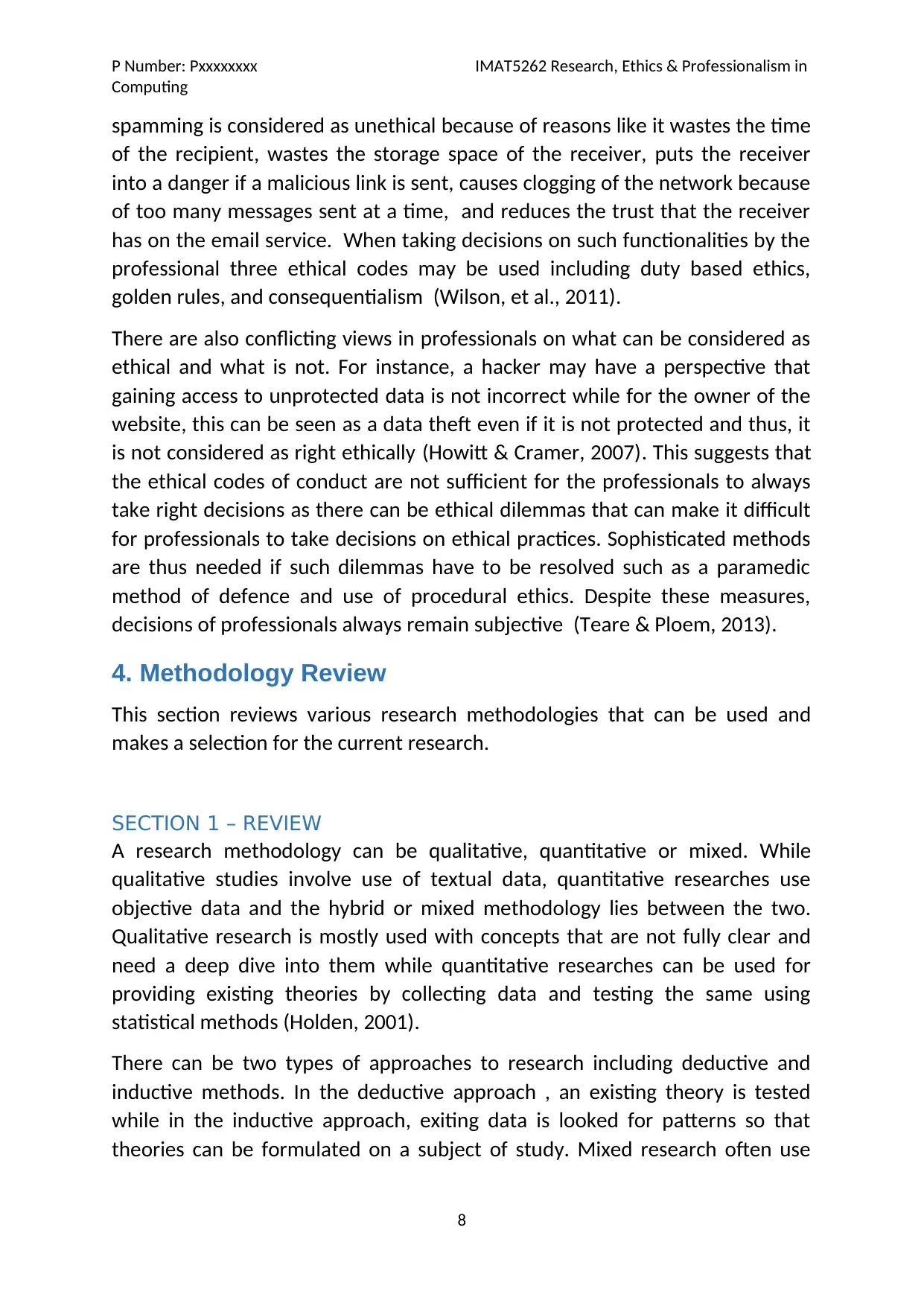
P Number: Pxxxxxxxx IMAT5262 Research, Ethics & Professionalism in
Computing
spamming is considered as unethical because of reasons like it wastes the time
of the recipient, wastes the storage space of the receiver, puts the receiver
into a danger if a malicious link is sent, causes clogging of the network because
of too many messages sent at a time, and reduces the trust that the receiver
has on the email service. When taking decisions on such functionalities by the
professional three ethical codes may be used including duty based ethics,
golden rules, and consequentialism (Wilson, et al., 2011).
There are also conflicting views in professionals on what can be considered as
ethical and what is not. For instance, a hacker may have a perspective that
gaining access to unprotected data is not incorrect while for the owner of the
website, this can be seen as a data theft even if it is not protected and thus, it
is not considered as right ethically (Howitt & Cramer, 2007). This suggests that
the ethical codes of conduct are not sufficient for the professionals to always
take right decisions as there can be ethical dilemmas that can make it difficult
for professionals to take decisions on ethical practices. Sophisticated methods
are thus needed if such dilemmas have to be resolved such as a paramedic
method of defence and use of procedural ethics. Despite these measures,
decisions of professionals always remain subjective (Teare & Ploem, 2013).
4. Methodology Review
This section reviews various research methodologies that can be used and
makes a selection for the current research.
SECTION 1 – REVIEW
A research methodology can be qualitative, quantitative or mixed. While
qualitative studies involve use of textual data, quantitative researches use
objective data and the hybrid or mixed methodology lies between the two.
Qualitative research is mostly used with concepts that are not fully clear and
need a deep dive into them while quantitative researches can be used for
providing existing theories by collecting data and testing the same using
statistical methods (Holden, 2001).
There can be two types of approaches to research including deductive and
inductive methods. In the deductive approach , an existing theory is tested
while in the inductive approach, exiting data is looked for patterns so that
theories can be formulated on a subject of study. Mixed research often use
8
Computing
spamming is considered as unethical because of reasons like it wastes the time
of the recipient, wastes the storage space of the receiver, puts the receiver
into a danger if a malicious link is sent, causes clogging of the network because
of too many messages sent at a time, and reduces the trust that the receiver
has on the email service. When taking decisions on such functionalities by the
professional three ethical codes may be used including duty based ethics,
golden rules, and consequentialism (Wilson, et al., 2011).
There are also conflicting views in professionals on what can be considered as
ethical and what is not. For instance, a hacker may have a perspective that
gaining access to unprotected data is not incorrect while for the owner of the
website, this can be seen as a data theft even if it is not protected and thus, it
is not considered as right ethically (Howitt & Cramer, 2007). This suggests that
the ethical codes of conduct are not sufficient for the professionals to always
take right decisions as there can be ethical dilemmas that can make it difficult
for professionals to take decisions on ethical practices. Sophisticated methods
are thus needed if such dilemmas have to be resolved such as a paramedic
method of defence and use of procedural ethics. Despite these measures,
decisions of professionals always remain subjective (Teare & Ploem, 2013).
4. Methodology Review
This section reviews various research methodologies that can be used and
makes a selection for the current research.
SECTION 1 – REVIEW
A research methodology can be qualitative, quantitative or mixed. While
qualitative studies involve use of textual data, quantitative researches use
objective data and the hybrid or mixed methodology lies between the two.
Qualitative research is mostly used with concepts that are not fully clear and
need a deep dive into them while quantitative researches can be used for
providing existing theories by collecting data and testing the same using
statistical methods (Holden, 2001).
There can be two types of approaches to research including deductive and
inductive methods. In the deductive approach , an existing theory is tested
while in the inductive approach, exiting data is looked for patterns so that
theories can be formulated on a subject of study. Mixed research often use
8
⊘ This is a preview!⊘
Do you want full access?
Subscribe today to unlock all pages.

Trusted by 1+ million students worldwide
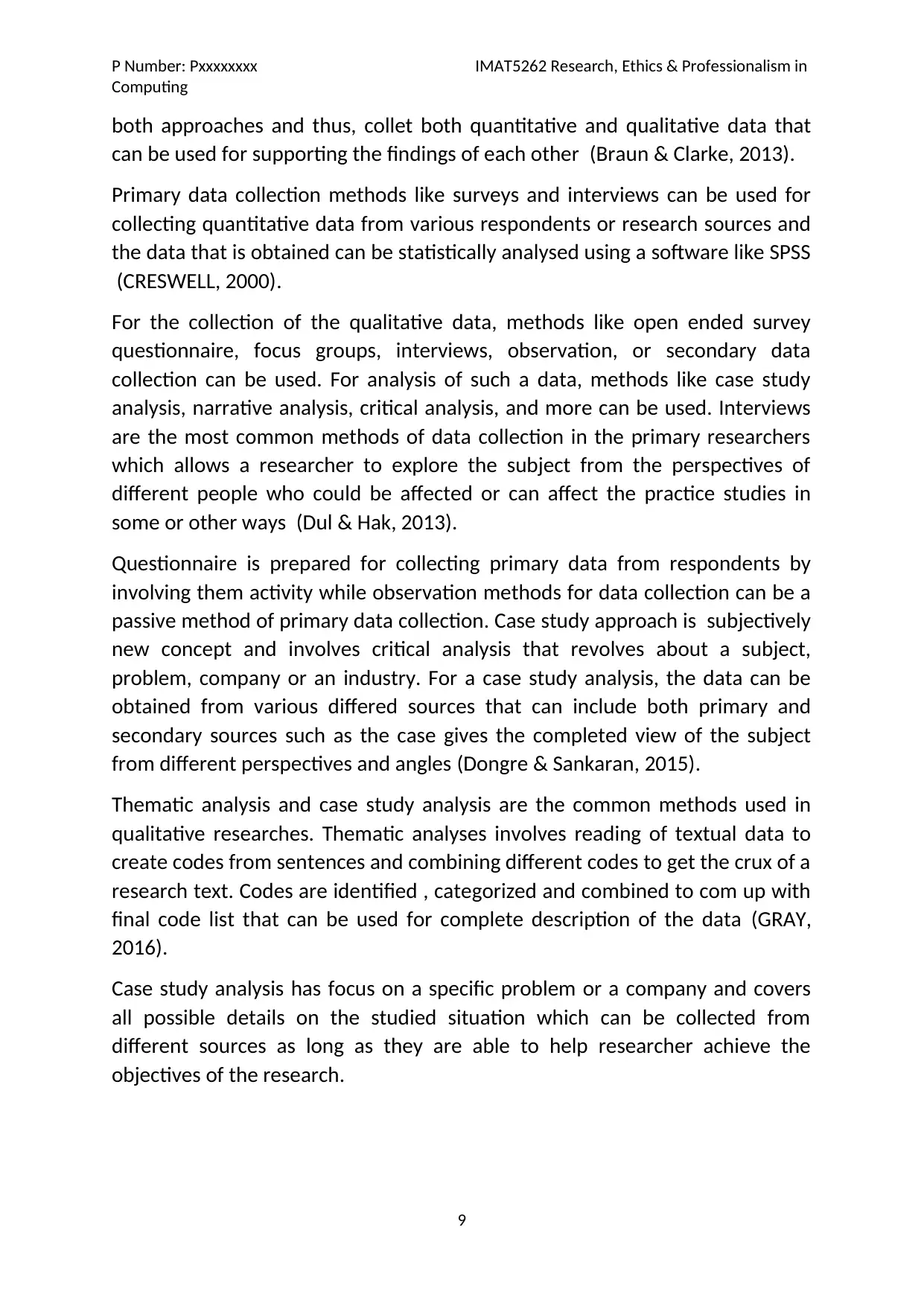
P Number: Pxxxxxxxx IMAT5262 Research, Ethics & Professionalism in
Computing
both approaches and thus, collet both quantitative and qualitative data that
can be used for supporting the findings of each other (Braun & Clarke, 2013).
Primary data collection methods like surveys and interviews can be used for
collecting quantitative data from various respondents or research sources and
the data that is obtained can be statistically analysed using a software like SPSS
(CRESWELL, 2000).
For the collection of the qualitative data, methods like open ended survey
questionnaire, focus groups, interviews, observation, or secondary data
collection can be used. For analysis of such a data, methods like case study
analysis, narrative analysis, critical analysis, and more can be used. Interviews
are the most common methods of data collection in the primary researchers
which allows a researcher to explore the subject from the perspectives of
different people who could be affected or can affect the practice studies in
some or other ways (Dul & Hak, 2013).
Questionnaire is prepared for collecting primary data from respondents by
involving them activity while observation methods for data collection can be a
passive method of primary data collection. Case study approach is subjectively
new concept and involves critical analysis that revolves about a subject,
problem, company or an industry. For a case study analysis, the data can be
obtained from various differed sources that can include both primary and
secondary sources such as the case gives the completed view of the subject
from different perspectives and angles (Dongre & Sankaran, 2015).
Thematic analysis and case study analysis are the common methods used in
qualitative researches. Thematic analyses involves reading of textual data to
create codes from sentences and combining different codes to get the crux of a
research text. Codes are identified , categorized and combined to com up with
final code list that can be used for complete description of the data (GRAY,
2016).
Case study analysis has focus on a specific problem or a company and covers
all possible details on the studied situation which can be collected from
different sources as long as they are able to help researcher achieve the
objectives of the research.
9
Computing
both approaches and thus, collet both quantitative and qualitative data that
can be used for supporting the findings of each other (Braun & Clarke, 2013).
Primary data collection methods like surveys and interviews can be used for
collecting quantitative data from various respondents or research sources and
the data that is obtained can be statistically analysed using a software like SPSS
(CRESWELL, 2000).
For the collection of the qualitative data, methods like open ended survey
questionnaire, focus groups, interviews, observation, or secondary data
collection can be used. For analysis of such a data, methods like case study
analysis, narrative analysis, critical analysis, and more can be used. Interviews
are the most common methods of data collection in the primary researchers
which allows a researcher to explore the subject from the perspectives of
different people who could be affected or can affect the practice studies in
some or other ways (Dul & Hak, 2013).
Questionnaire is prepared for collecting primary data from respondents by
involving them activity while observation methods for data collection can be a
passive method of primary data collection. Case study approach is subjectively
new concept and involves critical analysis that revolves about a subject,
problem, company or an industry. For a case study analysis, the data can be
obtained from various differed sources that can include both primary and
secondary sources such as the case gives the completed view of the subject
from different perspectives and angles (Dongre & Sankaran, 2015).
Thematic analysis and case study analysis are the common methods used in
qualitative researches. Thematic analyses involves reading of textual data to
create codes from sentences and combining different codes to get the crux of a
research text. Codes are identified , categorized and combined to com up with
final code list that can be used for complete description of the data (GRAY,
2016).
Case study analysis has focus on a specific problem or a company and covers
all possible details on the studied situation which can be collected from
different sources as long as they are able to help researcher achieve the
objectives of the research.
9
Paraphrase This Document
Need a fresh take? Get an instant paraphrase of this document with our AI Paraphraser
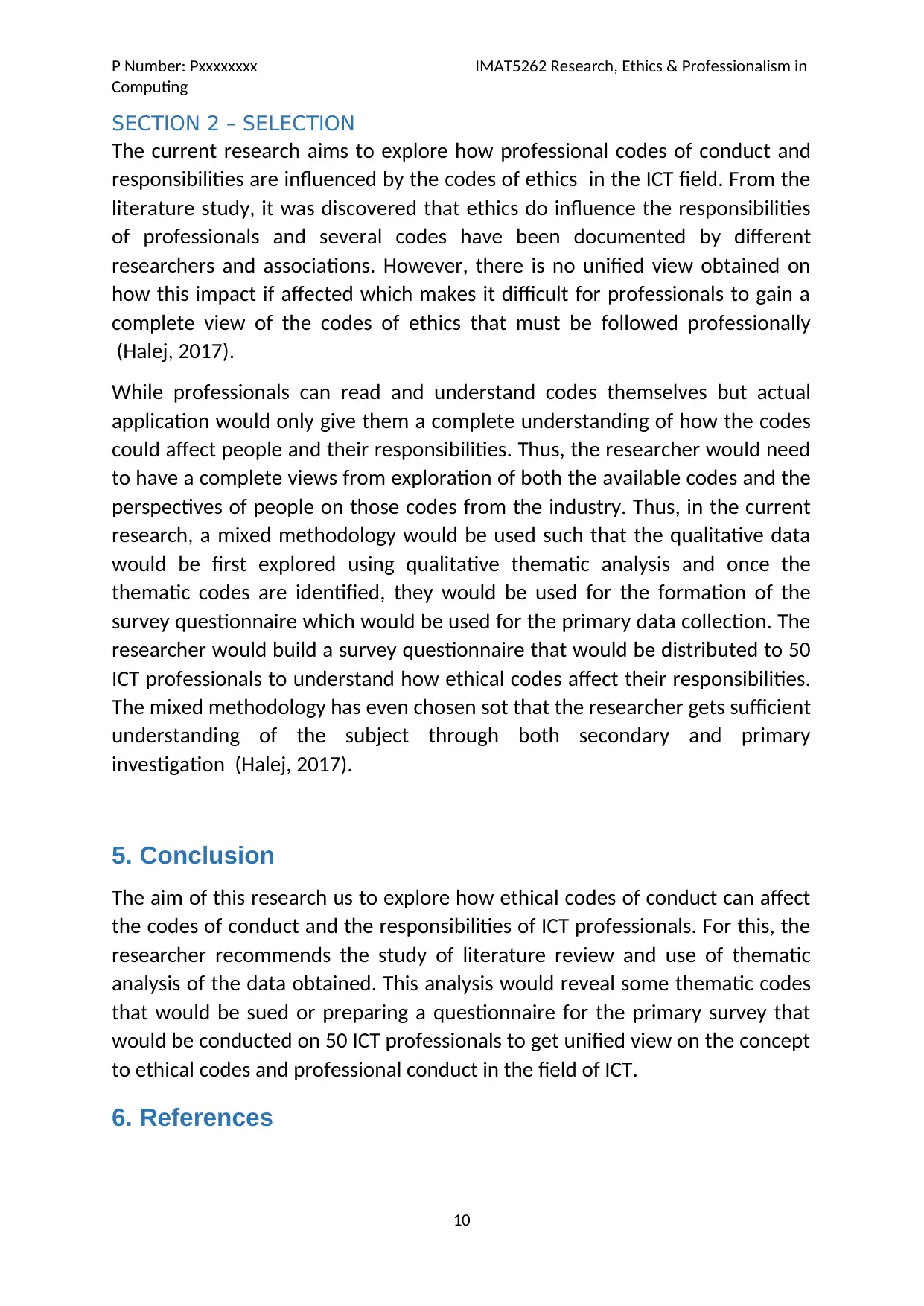
P Number: Pxxxxxxxx IMAT5262 Research, Ethics & Professionalism in
Computing
SECTION 2 – SELECTION
The current research aims to explore how professional codes of conduct and
responsibilities are influenced by the codes of ethics in the ICT field. From the
literature study, it was discovered that ethics do influence the responsibilities
of professionals and several codes have been documented by different
researchers and associations. However, there is no unified view obtained on
how this impact if affected which makes it difficult for professionals to gain a
complete view of the codes of ethics that must be followed professionally
(Halej, 2017).
While professionals can read and understand codes themselves but actual
application would only give them a complete understanding of how the codes
could affect people and their responsibilities. Thus, the researcher would need
to have a complete views from exploration of both the available codes and the
perspectives of people on those codes from the industry. Thus, in the current
research, a mixed methodology would be used such that the qualitative data
would be first explored using qualitative thematic analysis and once the
thematic codes are identified, they would be used for the formation of the
survey questionnaire which would be used for the primary data collection. The
researcher would build a survey questionnaire that would be distributed to 50
ICT professionals to understand how ethical codes affect their responsibilities.
The mixed methodology has even chosen sot that the researcher gets sufficient
understanding of the subject through both secondary and primary
investigation (Halej, 2017).
5. Conclusion
The aim of this research us to explore how ethical codes of conduct can affect
the codes of conduct and the responsibilities of ICT professionals. For this, the
researcher recommends the study of literature review and use of thematic
analysis of the data obtained. This analysis would reveal some thematic codes
that would be sued or preparing a questionnaire for the primary survey that
would be conducted on 50 ICT professionals to get unified view on the concept
to ethical codes and professional conduct in the field of ICT.
6. References
10
Computing
SECTION 2 – SELECTION
The current research aims to explore how professional codes of conduct and
responsibilities are influenced by the codes of ethics in the ICT field. From the
literature study, it was discovered that ethics do influence the responsibilities
of professionals and several codes have been documented by different
researchers and associations. However, there is no unified view obtained on
how this impact if affected which makes it difficult for professionals to gain a
complete view of the codes of ethics that must be followed professionally
(Halej, 2017).
While professionals can read and understand codes themselves but actual
application would only give them a complete understanding of how the codes
could affect people and their responsibilities. Thus, the researcher would need
to have a complete views from exploration of both the available codes and the
perspectives of people on those codes from the industry. Thus, in the current
research, a mixed methodology would be used such that the qualitative data
would be first explored using qualitative thematic analysis and once the
thematic codes are identified, they would be used for the formation of the
survey questionnaire which would be used for the primary data collection. The
researcher would build a survey questionnaire that would be distributed to 50
ICT professionals to understand how ethical codes affect their responsibilities.
The mixed methodology has even chosen sot that the researcher gets sufficient
understanding of the subject through both secondary and primary
investigation (Halej, 2017).
5. Conclusion
The aim of this research us to explore how ethical codes of conduct can affect
the codes of conduct and the responsibilities of ICT professionals. For this, the
researcher recommends the study of literature review and use of thematic
analysis of the data obtained. This analysis would reveal some thematic codes
that would be sued or preparing a questionnaire for the primary survey that
would be conducted on 50 ICT professionals to get unified view on the concept
to ethical codes and professional conduct in the field of ICT.
6. References
10
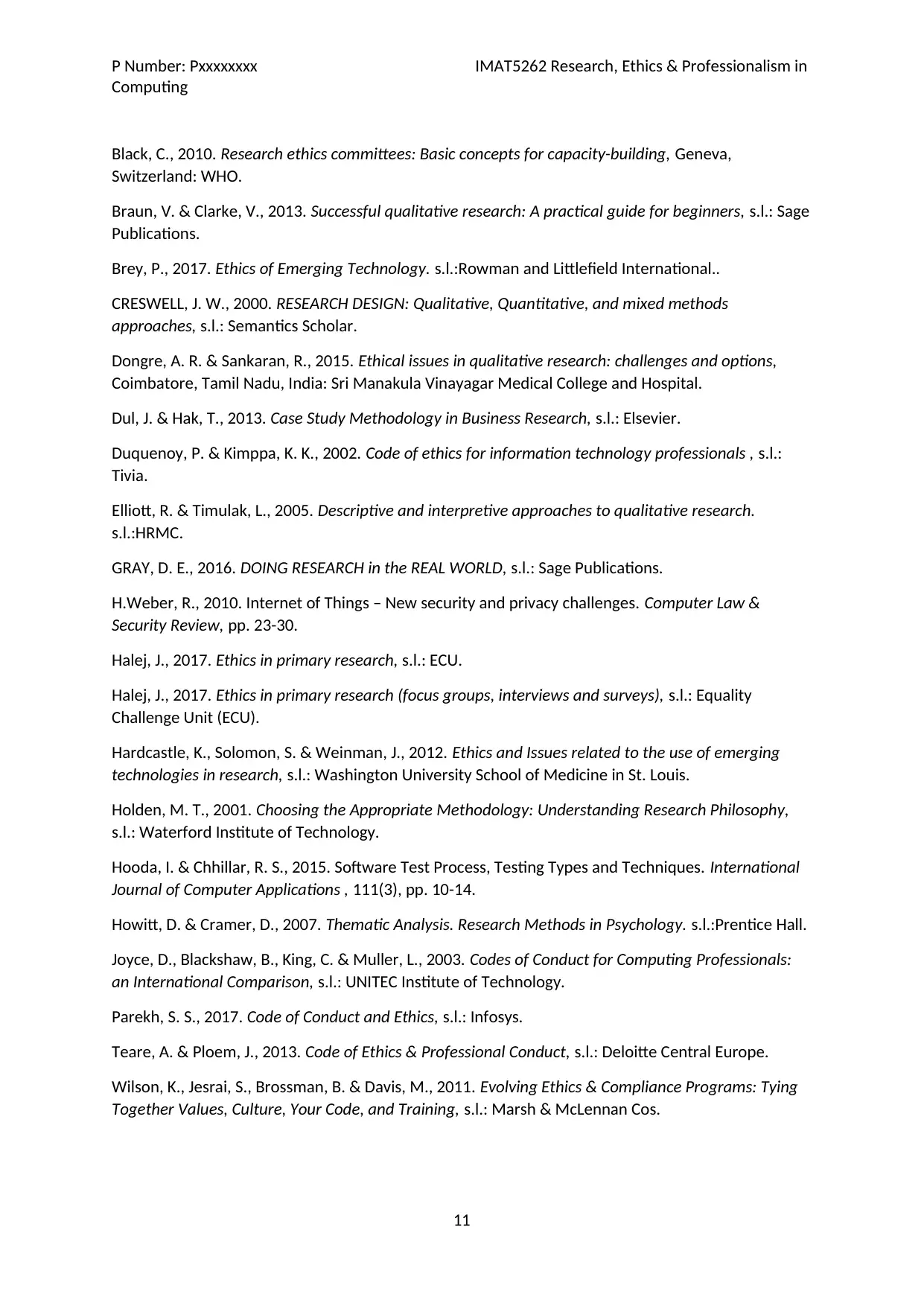
P Number: Pxxxxxxxx IMAT5262 Research, Ethics & Professionalism in
Computing
Black, C., 2010. Research ethics committees: Basic concepts for capacity-building, Geneva,
Switzerland: WHO.
Braun, V. & Clarke, V., 2013. Successful qualitative research: A practical guide for beginners, s.l.: Sage
Publications.
Brey, P., 2017. Ethics of Emerging Technology. s.l.:Rowman and Littlefield International..
CRESWELL, J. W., 2000. RESEARCH DESIGN: Qualitative, Quantitative, and mixed methods
approaches, s.l.: Semantics Scholar.
Dongre, A. R. & Sankaran, R., 2015. Ethical issues in qualitative research: challenges and options,
Coimbatore, Tamil Nadu, India: Sri Manakula Vinayagar Medical College and Hospital.
Dul, J. & Hak, T., 2013. Case Study Methodology in Business Research, s.l.: Elsevier.
Duquenoy, P. & Kimppa, K. K., 2002. Code of ethics for information technology professionals , s.l.:
Tivia.
Elliott, R. & Timulak, L., 2005. Descriptive and interpretive approaches to qualitative research.
s.l.:HRMC.
GRAY, D. E., 2016. DOING RESEARCH in the REAL WORLD, s.l.: Sage Publications.
H.Weber, R., 2010. Internet of Things – New security and privacy challenges. Computer Law &
Security Review, pp. 23-30.
Halej, J., 2017. Ethics in primary research, s.l.: ECU.
Halej, J., 2017. Ethics in primary research (focus groups, interviews and surveys), s.l.: Equality
Challenge Unit (ECU).
Hardcastle, K., Solomon, S. & Weinman, J., 2012. Ethics and Issues related to the use of emerging
technologies in research, s.l.: Washington University School of Medicine in St. Louis.
Holden, M. T., 2001. Choosing the Appropriate Methodology: Understanding Research Philosophy,
s.l.: Waterford Institute of Technology.
Hooda, I. & Chhillar, R. S., 2015. Software Test Process, Testing Types and Techniques. International
Journal of Computer Applications , 111(3), pp. 10-14.
Howitt, D. & Cramer, D., 2007. Thematic Analysis. Research Methods in Psychology. s.l.:Prentice Hall.
Joyce, D., Blackshaw, B., King, C. & Muller, L., 2003. Codes of Conduct for Computing Professionals:
an International Comparison, s.l.: UNITEC Institute of Technology.
Parekh, S. S., 2017. Code of Conduct and Ethics, s.l.: Infosys.
Teare, A. & Ploem, J., 2013. Code of Ethics & Professional Conduct, s.l.: Deloitte Central Europe.
Wilson, K., Jesrai, S., Brossman, B. & Davis, M., 2011. Evolving Ethics & Compliance Programs: Tying
Together Values, Culture, Your Code, and Training, s.l.: Marsh & McLennan Cos.
11
Computing
Black, C., 2010. Research ethics committees: Basic concepts for capacity-building, Geneva,
Switzerland: WHO.
Braun, V. & Clarke, V., 2013. Successful qualitative research: A practical guide for beginners, s.l.: Sage
Publications.
Brey, P., 2017. Ethics of Emerging Technology. s.l.:Rowman and Littlefield International..
CRESWELL, J. W., 2000. RESEARCH DESIGN: Qualitative, Quantitative, and mixed methods
approaches, s.l.: Semantics Scholar.
Dongre, A. R. & Sankaran, R., 2015. Ethical issues in qualitative research: challenges and options,
Coimbatore, Tamil Nadu, India: Sri Manakula Vinayagar Medical College and Hospital.
Dul, J. & Hak, T., 2013. Case Study Methodology in Business Research, s.l.: Elsevier.
Duquenoy, P. & Kimppa, K. K., 2002. Code of ethics for information technology professionals , s.l.:
Tivia.
Elliott, R. & Timulak, L., 2005. Descriptive and interpretive approaches to qualitative research.
s.l.:HRMC.
GRAY, D. E., 2016. DOING RESEARCH in the REAL WORLD, s.l.: Sage Publications.
H.Weber, R., 2010. Internet of Things – New security and privacy challenges. Computer Law &
Security Review, pp. 23-30.
Halej, J., 2017. Ethics in primary research, s.l.: ECU.
Halej, J., 2017. Ethics in primary research (focus groups, interviews and surveys), s.l.: Equality
Challenge Unit (ECU).
Hardcastle, K., Solomon, S. & Weinman, J., 2012. Ethics and Issues related to the use of emerging
technologies in research, s.l.: Washington University School of Medicine in St. Louis.
Holden, M. T., 2001. Choosing the Appropriate Methodology: Understanding Research Philosophy,
s.l.: Waterford Institute of Technology.
Hooda, I. & Chhillar, R. S., 2015. Software Test Process, Testing Types and Techniques. International
Journal of Computer Applications , 111(3), pp. 10-14.
Howitt, D. & Cramer, D., 2007. Thematic Analysis. Research Methods in Psychology. s.l.:Prentice Hall.
Joyce, D., Blackshaw, B., King, C. & Muller, L., 2003. Codes of Conduct for Computing Professionals:
an International Comparison, s.l.: UNITEC Institute of Technology.
Parekh, S. S., 2017. Code of Conduct and Ethics, s.l.: Infosys.
Teare, A. & Ploem, J., 2013. Code of Ethics & Professional Conduct, s.l.: Deloitte Central Europe.
Wilson, K., Jesrai, S., Brossman, B. & Davis, M., 2011. Evolving Ethics & Compliance Programs: Tying
Together Values, Culture, Your Code, and Training, s.l.: Marsh & McLennan Cos.
11
⊘ This is a preview!⊘
Do you want full access?
Subscribe today to unlock all pages.

Trusted by 1+ million students worldwide
1 out of 25
Related Documents
Your All-in-One AI-Powered Toolkit for Academic Success.
+13062052269
info@desklib.com
Available 24*7 on WhatsApp / Email
![[object Object]](/_next/static/media/star-bottom.7253800d.svg)
Unlock your academic potential
Copyright © 2020–2026 A2Z Services. All Rights Reserved. Developed and managed by ZUCOL.





